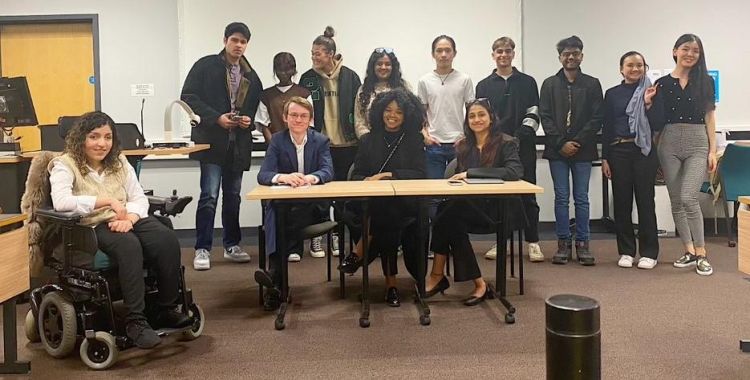School of Law students debate the single use plastics in the aftermath of the Covid-19 pandemic

On the 25 March, the student led Environmental Law and Sustainability Society hosted a debate to spark discussion on the impact of Covid-19 on our environment.
The COVID-19 pandemic is a complex, disruptive event with impacts that go beyond those related to health and economy. About 26,000 tonnes of plastic Covid waste has polluted the world’s oceans since the start of the pandemic, and thousands of masks and gloves are still appearing on our beaches and streets.
Two teams of students debated the motion "Single Use Plastic Should be Banned" and discussed the need to rethink the use of all plastic, particularly the single-use plastic production, consumption, and waste management practices to able to respond to the continued impacts from this pandemic and minimise its consequences for the future of our planet.
The group in favour of the motion to ban single-use plastics argued that a ban could be the best way to prevent harmful waste. Single-use plastic contributes to the microplastics that end up in water and are consumed by animals. A significant proportion of pollution in the oceans is caused by single-use plastics and the production of single-use plastic also contributes to carbon emissions and in turn to climate change. In addition, the negative impacts of single-use plastics are felt disproportionately by developing countries. Bans on single-use plastics have been shown to significantly reduce plastic use.
The group against the motion argued that banning single-use plastics can do more harm than good as alternatives to single-use plastics can have a worse environmental impact than plastic. Production of paper bags, for instance, produce higher CO2 emissions than plastic bags. It is also possible to reduce plastic use without resorting to draconian bans. For example, businesses can be incentivised to produce and use alternatives to plastics where the use of plastic is damaging. Plastic is a cheap and extremely useful material. Rather than banning it, it would be better to focus on more effective ways of preventing waste such as recycling policies. Also, single-use plastic is not the largest source of plastic pollution, so banning it will not adequately address the problem of plastic waste.
The winner of the individual best performance of the debate was Abhishek Roy. The winning team was the team for the motion, which included Fatoumata Bayo Diba, Kirti Bhardwaj, Vikramaditya Katoch and Karisse Christodoulou.
The School of Law’s Mooting and Debating Coordinator Dr Stuart Goosey said “This event explored legal issues of environmental justice further to building a network of ecologically minded law students and promoting environmental justice through advocacy".




